HOW TO ..... GET FOREIGN TV CHANNELS IN SPAIN?
Saturday, November 29, 2025
 I wrote about this topic some 18 months ago when several satellites beaming in UK channels were turned off without warning (link to article below). This was mainly in southern Spain. "Guiris" in other parts of Spain could continue to view their favourite channels from home as before. I wrote about this topic some 18 months ago when several satellites beaming in UK channels were turned off without warning (link to article below). This was mainly in southern Spain. "Guiris" in other parts of Spain could continue to view their favourite channels from home as before.
[Smart Aerials]
Backstory
For southern Spain there were a number of workarounds, including streaming, VPN and Amazon Firestick, as well as very expensive internet-based systems.
  
Streaming [Eroski Computer] VPN [Amazon] Firestick [Amazon]
I and several other "guiris" round here chose to go the Firestick route with a guy in Estepona who was selling Firesticks pre-loaded with 1000s of foreign channels. I was happy with this solution initially, until I found out that such services are highly illegal and punishable with huge fines.
Then this very week my service disappeared, despite having paid up to April 2026.
 I am now firmly of the opinion that my guy in Estepona is a charlatan. He's not only cut off my service, but he is impossible to contact by phone; he ignores text messages and I've heard via another of his victims that he is now living in the UK and is seriously ill. Well, he may be terminally ill, but he still has obligations to his clients. I am now firmly of the opinion that my guy in Estepona is a charlatan. He's not only cut off my service, but he is impossible to contact by phone; he ignores text messages and I've heard via another of his victims that he is now living in the UK and is seriously ill. Well, he may be terminally ill, but he still has obligations to his clients.
For everybody's information this "crook" goes by the name of Dusty Mitts, quite clearly not his real name.
[Advertisement on Facebook]
 As for me and the missus we are going to go down the VPN route, probably with NORD VPN. As for me and the missus we are going to go down the VPN route, probably with NORD VPN.
They have a special offer which expires today, so we'll have to get our skates on .....
[Xataka]
Link to original article:
How to watch British TV in Spain in 2024 and beyond
STOP PRESS:
Look what I found in just five minutes of web-browsing:
Adi Lennon: "Anyone know how to contact Dusty Mitts IPTV. My system has gone down, tried the new Spanish mobile number and nothing, as switched off, no reply to whatsapp or facebook."
Martin Brown: "Ah...the weekly 'where is Dusty Mitts' post. I don't know him so can't comment on his service...but he seems to be one of the world's most polarising characters."
Jackie Waters: "All the bad reports I am surprised people still use him. Pay cheap pay twice !"
Rowena Alderson: "Forget Dusty Mitts. He’s always been unreliable and now like the Invisible Man."
Jo-Anne Hodkinson: "I’m having problems too, for the second time I’ve paid for 12 months but only getting 6 months. Messaged several times but no response."
Evy Eguiluz: "Dusty Mitts is not reliable at all."
***
© The DIY Guy
Pictures:
Amazon, Eroski Computer, Facebook, Smart Aerials, Xataka
Thanks to:
Elaine Love, Estepona Info & Chat, Eye on Spain, Nick Flynn, Nord VPN, The Curmudgeon
Tags:
Amazon, DIY Guy, Dusty Mitts, Elaine Love, Eroski Computer, Estepona Info & Chat, Eye on Spain, Facebook, Nick Flynn, Nord VPN, Smart Aerials, The Curmudgeon, Xataka
 0
Like
Published at 3:03 PM Comments (0)
0
Like
Published at 3:03 PM Comments (0)
HOW TO ….. PREPARE FOR WINTER in Spain
Friday, September 26, 2025
How to ….. prepare for winter in inland Andalucia
 We have entered meteorological Autumn and are more than half-way through September. We have entered meteorological Autumn and are more than half-way through September.
Night temperatures are dropping and the first frosts won't be far away.
My frosty garden in 2024 [Paul Whitelock]
Time to get ready for the cold winter months. The climate in this part of Spain is defined as continental:
"Nueve meses de infierno y tres de invierno."
In the garden
Wrap vulnerable plants such as bougainvilla, dama de noche, young wisteria, in fleece, available at garden centres (viveros), as soon as frost is forecast, otherwise you are likely to lose them.
 Make sure you have plenty of firewood for your chimenea. I've stopped buying logs - they're too expensive. Instead, I collect discarded wood from the "basura", e.g. pallets, broken furniture if it's unpainted and not lacquered, branches, and cut/saw them into wood-fire-sized "logs". Just be sure you don't burn anything which gives off toxic fumes. Also make sure it's legal in your area, and get your chimney swept regularly (with thanks to Lorna Fisher - see first comment below). Make sure you have plenty of firewood for your chimenea. I've stopped buying logs - they're too expensive. Instead, I collect discarded wood from the "basura", e.g. pallets, broken furniture if it's unpainted and not lacquered, branches, and cut/saw them into wood-fire-sized "logs". Just be sure you don't burn anything which gives off toxic fumes. Also make sure it's legal in your area, and get your chimney swept regularly (with thanks to Lorna Fisher - see first comment below).
After recent storms, several trees in the garden have blown down. Armed with my trusty chainsaw they too have gone into my log store. I reckon I've enough lumber for three winters.
[Deposit Photos]
In the house
If you have a pellet stove, buy your pellets now before they go up in price. 15 kilo sacks are currently on sale round here at various prices, ranging from 4.99 to 5.75 euros per sack.
If you use heating oil (gasoil) fill your tank now before prices shoot up. Supply and demand determines prices.
If you rely on bombonas (gas bottles) for cooking and/or hot water and/or portable gas heaters, make sure you have enough.
In our village house we need five: hot water, two gas heaters, gas cooker and one spare. Check that your gas heaters are working. Sometimes the jets get blocked with accumulated dust from months of non-use.
 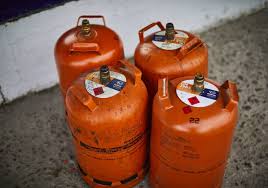 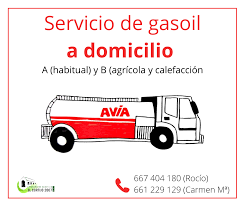
Pellet stove [Climmatic] Bombonas [Repsol] Avia domestic distribution [Facebook]
In the bedroom
 It's time to clear out light summer clothing, such as t-shirts, polo shirts, shorts, thin dresses, and stuff our wardrobes full of warm clothing, like long trousers, undervests, long-sleeved shirts, thick skirts and dresses, pullovers and woolly tops, warm outer garments and sturdy shoes. It's time to clear out light summer clothing, such as t-shirts, polo shirts, shorts, thin dresses, and stuff our wardrobes full of warm clothing, like long trousers, undervests, long-sleeved shirts, thick skirts and dresses, pullovers and woolly tops, warm outer garments and sturdy shoes.
It gets very cold in the mountains, between November and February.
[British Heart Foundation]
Good luck! Be prepared!
Related Links
Jack Frost in Andalucía - Eye on Spain
Jack Frost in Andalucía - Olive Press News Spain
Jack Frost in Andalucía - Secret Serrania de Ronda
LOG BLOG: How to keep warm and cosy during winter in Spain - Secret Serrania
Log blog! - Olive Press News Spain
In Love with SEVILLA - at last! - Help me, Ronda
© The Crazy Guy
Images:
British Heart Foundation, Climmatic, Deposit Photos, Facebook, Paul Whitelock, Repsol
Tags:
15 kilo sacks, bombona, bougainvilla, branches, British Heart Foundation, broken furniture, chimenea, Climmatic, dama de noche, Deposit Photos, Eye on Spain, Facebook, firewood, fleece, frost, gas bottle, gasoil, heating oil, Jack Frost in Andalucia, log blog, logs, "Nueve meses de infierno y tres de invierno", pallets, Paul Whitelock, pellets, pellet stove, portable gas heater, Repsol, Secret Serrania, Sevilla, The Olive Press, vivero, wisteria, wood-fire-sized "logs",
 2
Like
Published at 9:23 AM Comments (2)
2
Like
Published at 9:23 AM Comments (2)
HOW TO ..... SELL A HOUSE in a hurry
Tuesday, September 2, 2025
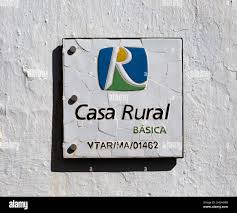 I own two properties in Spain. My domicilio in the campo outside Ronda and a vivienda rural in nearby Montejaque. I own two properties in Spain. My domicilio in the campo outside Ronda and a vivienda rural in nearby Montejaque.
"You have to sell your rental house as soon as possible," says the missus.
Well she is the boss.
Se vende
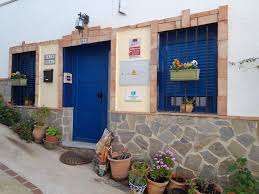 So Casa Real is on the market and is now priced to sell. I've reduced the asking price and am happy to do a deal on the furniture and fittings. So Casa Real is on the market and is now priced to sell. I've reduced the asking price and am happy to do a deal on the furniture and fittings.
I have a viewing tomorrow morning by a UK couple who really like Montejaque. Apparently, they've looked elsewhere, eg El Gastor and Montecorto, but they seem to prefer Montejaque. I understand that. It's my favourite "pueblo blanco" (white village).
When I die I plan to go into a nicho in the cemetery.
[Photo: Karl Smallman, Secret Serrania]
The budget of the clients is less than I am prepared to accept, but let's see what happens.
So, what have I done to present the house in its best light.
Today I painted some feature walls that were looking a bit jaded. I also cleared out all the dead plants outside and planted new ones.
Tomorrow early, I shall sort out the roof terrace. Prune the plants and dress the terrace furniture.
A bit of cleaning (dust and debris on the floor) and we'll be ready.
Then, shortly before the arrival of the punters, I shall put on some strategic lighting and get the coffee on.
 The contact is via Love Viviendas, an estate agency run by a friend of mine. The contact is via Love Viviendas, an estate agency run by a friend of mine.
So, Ian will show the house (well, he's got to do something for his hefty 4% commission!) and I'll be on hand to answer any questions.
I've done what we do do in the UK - presented the house well. I've decluttered and sorted out the plants, the beds are made and the bathrooms are clean and tidy. Soft music and the smell of coffee should guarantee a sale.
I'll get back to you
.....
Update 1
The viewing went well. the potential purchasers, Tracy and Robert, who live near Bristol, where my brother also lives, made lots of positive comments. Of the many houses they've seen this week, mine had the best kerb appeal. They loved the huge roof terrace with the stunning views. They liked the location, close to the village square. They were also impressed by the way in which I had reconfigured the downstairs.
But, will they make an offer?
Update 2
No, they didn't!
However, I have another interested person. Mike, already resident in Spain with a property in Chiclana, wants to move to the Ronda area. He is currently in the UK but will be back in Andalucia next week and wants to view. This would be a private deal with no estate agent involved
© Paul Whitelock
Acknowledgements:
Alamy, Love Viviendas, Paul Whitelock,
Tags:
Alamy, campo, domicilio, El Gastor, Love Viviendas, Montecorto, Montejaque, nicho, Paul Whitelock, "pueblo blanco", Ronda, vivienda rural
 1
Like
Published at 9:18 PM Comments (1)
1
Like
Published at 9:18 PM Comments (1)
How to ….. BUILD A PERGOLA / CARPORT?
Friday, July 18, 2025
 I've built a few pergolas and one carport in my time. They are essentially the same, except a carport has a roof of some kind. I've built a few pergolas and one carport in my time. They are essentially the same, except a carport has a roof of some kind.
Two pergolas in England and three in Spain and one carport in Spain.
It's been interesting, what with the variation in the quality of materials and different construction methods.
Although it was a long time ago, I recall that building such structures in England was relatively straightforward.
In Spain, less so.
[Photo courtesy of Homebase]
What you need
  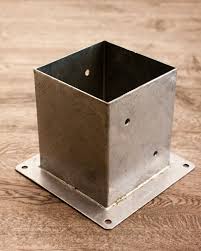
[Anticuable] [Rusticos Juan Garcia] [Maderas Menga]
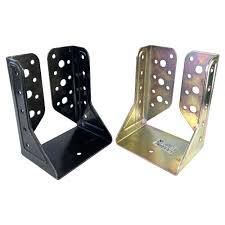
[Union Ferretera]
Check out this online video on building a carport by BYOT (Bring Your Own Technology):
¿Conoces la Cuenta y Tarjeta Joven BBVA?
My pergolas
The first pergola I built was at our house in Thelwall (Warrington) in around 2004 using reclaimed timber, with my teenage son, Tom, as my helper.
The second was at my house in Latchford (also Warrington) following my redundancy, divorce and nervous breakdown.
Once again, my "labourer" was my son Tom, who had just finished his A-Levels, was at a loose end and needed to earn money. That was in 2008.
Pergolas in Spain
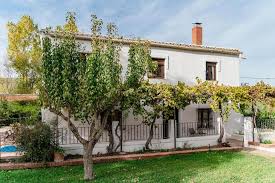 In between times I built, alone, the best pergola I've managed to date. That was on the reconstructed terrace of a house I bought in Ronda in 2003 to do up and put on the market as a holiday rental. In between times I built, alone, the best pergola I've managed to date. That was on the reconstructed terrace of a house I bought in Ronda in 2003 to do up and put on the market as a holiday rental.
Over a couple of years, I had help with the renovation of Casa Blanca from friends and family: Alan Shepherd, Amy Whitelock, Jeryl Whitelock, Johnny White and Tom Whitelock.
[Photo courtesy of Booking.com]
Ultimately I had to sell Casa Blanca to fund the purchase of a house in Latchford (q.v.) in 2008. As a result of the renovation and the state of the housing market at that time, ie (before the world economic crash in 2010), I made a significant capital gain.
I also built a pergola for clients who had employed me to renovate their house.
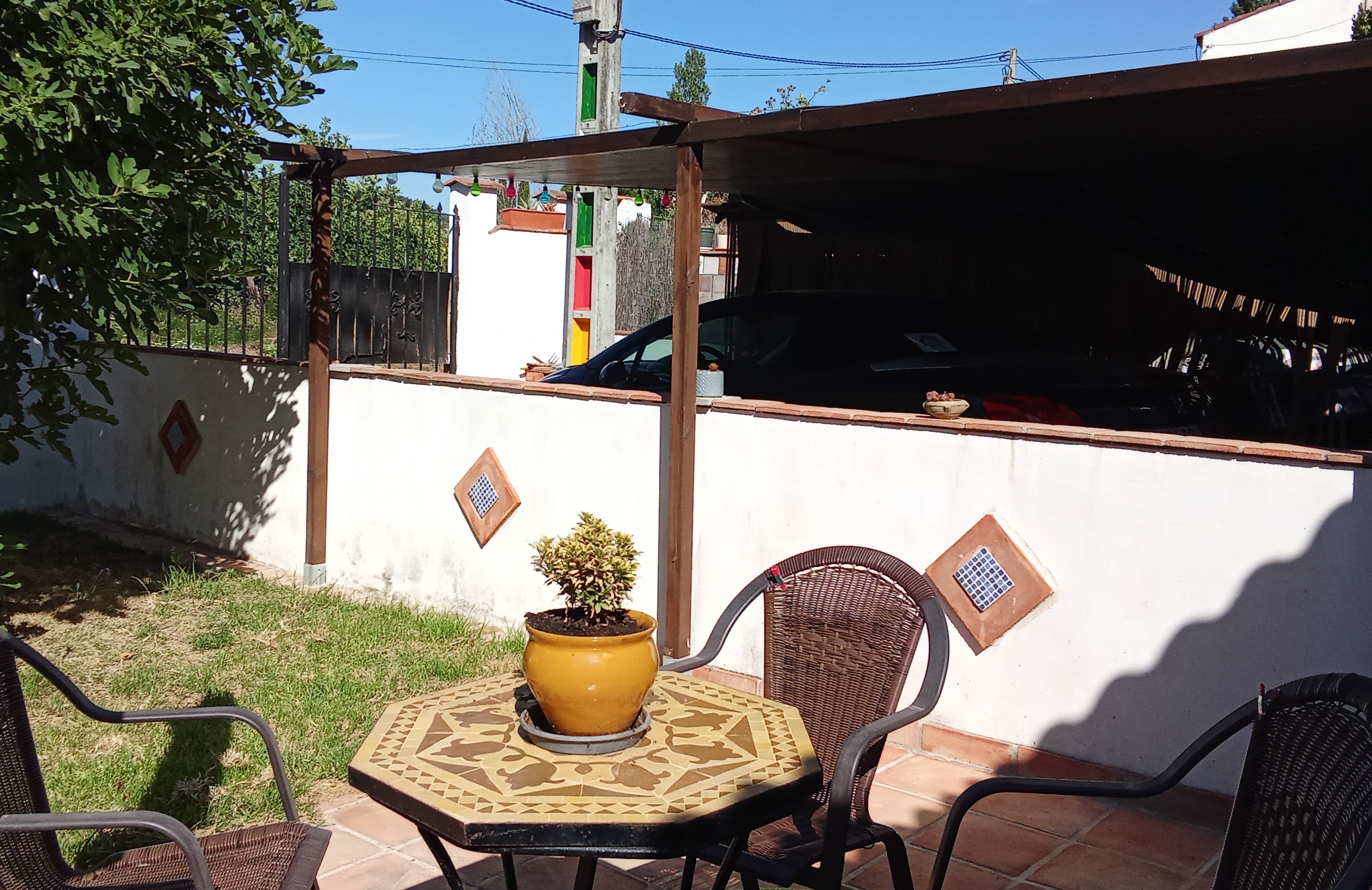 Three years ago I built a carport at our domicilio just outside Ronda with the help of my friend Michael. Three years ago I built a carport at our domicilio just outside Ronda with the help of my friend Michael.
That does a great job in protecting the paintwork from the searing sun, which acts like paintstripper.
[Photo by Paul Whitelock]
Currently I am building a pergola at the house.
We have a terrace outside our bedroom, which needs more shade. So I am building a pergola for the grape vine and the bougainvilla to grow over, which will give us much needed shade in this suntrap, which has vicious sun all day long.
(awaiting photo)
Conclusion
Pergolas and carports are great, aren't they? Fun to build and a definite asset.
© Pablo de Ronda
Photos:
Booking.com, Homebase, Paul Whitelock,
Links:
The Houses That Jack Built - Eye on Spain
The houses that Jack built! - Secret Serrania de Ronda
¿Conoces la Cuenta y Tarjeta Joven BBVA? - BYOT
Thanks:
Alan Shepherd, Amy Whitelock, BYOT, Jeryl Whitelock, Johnny White, Tom Whitelock,
Tags:
Alan Shepherd, Amy Whitelock, Anticuable, Booking.com, BYOT, carport, Homebase, Jeryl Whitelock, Johnny White, Latchford, Maderas Menga, Montejaque, Paul Whitelock, pergola, Ronda, Ronda, Rusticos Juan Garcia, Thelwall, Tom Whitelock, Union Ferretera, Warrington
 0
Like
Published at 6:35 AM Comments (0)
0
Like
Published at 6:35 AM Comments (0)
HOW TO ….. become a SPANISH RESIDENT? - New rules
Thursday, April 10, 2025
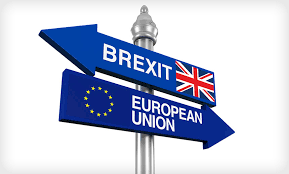 Since the UK formally left the European Union on January 1st, 2020 - commonly known as BREXIT - it has become a lot harder to become a Spanish resident. New rules apply, as they do for other non-EU members. Since the UK formally left the European Union on January 1st, 2020 - commonly known as BREXIT - it has become a lot harder to become a Spanish resident. New rules apply, as they do for other non-EU members.
[Image courtesy of BankInfoSecurity]
Backstory
 The British voted to leave the EU on June 16th, 2016, by a margin of 51.9% to 48.1%. The leave campaign led by the "charismatic" Bojo the Clown (Boris Johnson) famously lied throughout the campaign. Nigel Farage, then leader of UKIP was uncompromising in his desire to leave Europe. The British voted to leave the EU on June 16th, 2016, by a margin of 51.9% to 48.1%. The leave campaign led by the "charismatic" Bojo the Clown (Boris Johnson) famously lied throughout the campaign. Nigel Farage, then leader of UKIP was uncompromising in his desire to leave Europe.
[Image courtesy of Facebook]
Johnson is now a disgraced politician and human being, largely because of his incompetence and hypocrisy over party-gate.
Farage is now leader of Reform, the successor to UKIP, who has finally been elected as MP for Clacton-on-Sea (Essex), following the massive demise of the Conservative Party.
How to become a resident if you're British
The options at the start of BREXIT in January 2020 were these:
 If you were already living in Spain and had a NIE, all you had to do was upgrade to a TIE (not compulsory, but advisable); have a Spanish bank account; and exchange your UK driving licence for a Spanish permiso de conducir. If you were already living in Spain and had a NIE, all you had to do was upgrade to a TIE (not compulsory, but advisable); have a Spanish bank account; and exchange your UK driving licence for a Spanish permiso de conducir.- Get employment in Spain and comply with the above.
- Get NLV (Non-Lucrative Visa) status.
- Apply for a "golden visa", ie "buy your residency" by investing at least 500,000 euros in a property in Spain.
- Become a "digital nomad".
- Apply for Spanish nationality.
[Image courtesy of Spain Law Hub]
How's it going?
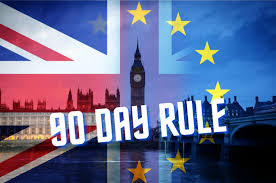 Long-term British residents who didn't bother to fulfil the requirements suddenly found themselves subject to the 90-day-rule. Many have been barred from living in their homes for longer than the permitted number of days. Others have been tracked down and extradited and heavily fined. Their illegal cars have been seized and crushed. Their unoccupied homes are vulnerable to okupas (squatters). Long-term British residents who didn't bother to fulfil the requirements suddenly found themselves subject to the 90-day-rule. Many have been barred from living in their homes for longer than the permitted number of days. Others have been tracked down and extradited and heavily fined. Their illegal cars have been seized and crushed. Their unoccupied homes are vulnerable to okupas (squatters).
I have little sympathy, it serves them right. The requirements were well publicised, well in advance, so they have no excuse for not complying.
[Image courtesy of SGM Abogados]
British workers, mainly tradesmen, are still able to come to Spain to work on extended contracts, although they do not get residency status.
Many Brits desiring residency have acquired NLVs which means they are not allowed to work and earn money. These are mainly retired people with sufficient financial means to live in Spain.
The digital nomad programme has expanded greatly and is thriving.
Thousands of foreigners have applied for Spanish nationality. The majority are "refugees" from Spanish-speaking countries in Latin America, such as Argentina, Chile, Cuba, Dominican Republic, Mexico, Peru, Uruguay and Venezuela. That is a relatively straightforward process. For non-native-Spanish speakers from outside the EU, it's trickier, but do-able. I intend to make an application this month.
A major change to the rules
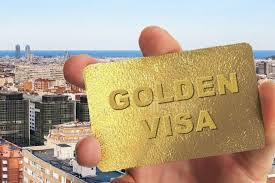 As of April 3rd, the "golden visa" option has been cancelled. As of April 3rd, the "golden visa" option has been cancelled.
Many commentators regard this decision by Pedro Sanchez' government to be a mistake.
The Press and media have had a field day. The BBC posted this on its website:
Spain to axe 'golden visas' scheme
[Photo courtesy of Navas & Cusi]
and the English freebie published in Spain, the EuroWeekly News, said this:
Spain scraps golden visas « Euro Weekly News
The national newspapers in Spain also led on the story:
 Adiós a las ‘golden visa’: ya no se podrá adquirir el permiso de residencia por inversiones inmobiliarias | Economía | EL PAÍS Adiós a las ‘golden visa’: ya no se podrá adquirir el permiso de residencia por inversiones inmobiliarias | Economía | EL PAÍS
Las 'Golden Visa' ya son historia y a partir de hoy dejan de concederse | Actualidad Económica - El Mundo
Ten key golden visa stats as Spain axes scheme for wealthy foreigners - The Local
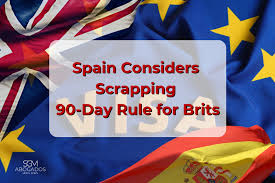 The Spanish government is actively looking at ways to axe the 90-day-rule. The Spanish government is actively looking at ways to axe the 90-day-rule.
This would be a big boost for those affected and would bring much needed extra cash into the Spanish economy.
[Image courtesy of SGM Abogados]
Other links:
All TIE’d up! How to apply for the Tarjeta de Identidad de Extranjero in Spain - www.secretserrania.com
DIGITAL NOMADS - Help me, Ronda - www.help-me-ronda.com
HOW TO …..apply for a replacement TIE - www.eyeonspain.com
Photos and images:
BankInfoSecurity, Facebook, Navas & Cusi, SGM Abogados, Spain Law Hub, Wikipedia
© The Crazy Guy (Paul Whitelock)
Acknowledgements:
BBC, EuroWeekly News, El Mundo, El Pais, The Local
Tags:
Argentina, BankInfoSecurity, BBC, Chile, Cuba, Dominican Republic, EuroWeekly News, El Mundo, El Pais, Facebook, "golden visa", Latin America, Mexico, Navas & Cusi, non-native-Spanish speakers, Paul Whitelock, Pedro Sanchez, Peru, "refugees", SGM Abogados, Spain Law Hub, Spanish nationality, Spanish-speaking countries, The Crazy Guy, The Local, Uruguay, Venezuela, Wikipedia, www.eyeonspain.com, www.help-me-ronda.com, www.secretserrania.com
 0
Like
Published at 10:47 AM Comments (5)
0
Like
Published at 10:47 AM Comments (5)
How to ….. STOP SPAM CALLS in Spain
Tuesday, November 19, 2024
By The Crazy Guy
 When I lived in the UK I never received any spam calls, because I was on the TPS, Telephone Preference Service, which put you on a list of people who did not want spam calls. Occasionally, a call slipped through, but as soon as I told the spam caller that I was on the TPS, they hung up immediately. For abusing the TPS, companies could receive a heavy fine. When I lived in the UK I never received any spam calls, because I was on the TPS, Telephone Preference Service, which put you on a list of people who did not want spam calls. Occasionally, a call slipped through, but as soon as I told the spam caller that I was on the TPS, they hung up immediately. For abusing the TPS, companies could receive a heavy fine.
My experience
I have lived in Spain for 16 years and receive spam calls on a daily basis. What really gets me is that when you tell the caller that you don’t react to spam calls, THEY ARGUE WITH YOU!
What is the matter with these people?
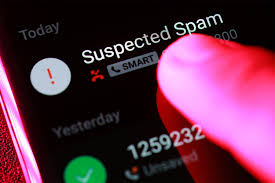 My current android mobile identifies suspicious calls, so I usually don’t answer. I call back and the number is not recognised, proving that I was right not to answer. My current android mobile identifies suspicious calls, so I usually don’t answer. I call back and the number is not recognised, proving that I was right not to answer.
Occasionally, a call identified as suspicious, is not. For example, my doctor’s surgery or my bank.
It’s really not very impressive. If the UK could whack it 20 years ago, why not Spain?
The current situation
Unsolicited commercial calls without prior consent have been outlawed under the new General Telecommunications Law since June 2023. But some sly callers still manage to get through.
To make matters worse, robot-callers and cybercriminals are also ringing you, using aggressive marketing tactics to swindle you out of personal data or even hard-earned cash.
Help is at hand
If you’re “sick to the back teeth” of your phone ringing with annoying and time-consuming spam calls, it’s time to give those nuisance callers the boot.
 By signing up to the Spanish Telephone Preference Service (Lista Robinson), and tweaking some simple settings on your mobile, you can make your number pretty much invisible, making it difficult for telemarketers and fraudsters alike. By signing up to the Spanish Telephone Preference Service (Lista Robinson), and tweaking some simple settings on your mobile, you can make your number pretty much invisible, making it difficult for telemarketers and fraudsters alike.
Unfortunately, it’s not foolproof, but it makes it harder for them to ring. Think of it as putting on an invisibility cloak for your phone.
What to do
Register with the Robinson List (Lista Robinson).
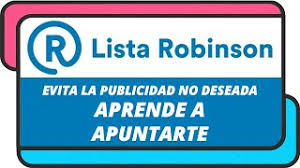 It’s a free telephone preference service in Spain that allows you to opt out of unsolicited marketing calls. Visit the official website www.listarobinson.es and follow the registration steps. It’s a free telephone preference service in Spain that allows you to opt out of unsolicited marketing calls. Visit the official website www.listarobinson.es and follow the registration steps.
You can also install call-blocking apps that nip unwanted callers in the bud.
For iPhone users: Truecaller and Hiya identify and block spam calls at lightning speed, ensuring you’re not left hanging on hold with scammers. You only need one of these, so take your pick.
For Android users: Truecaller, Hiya, and Mr. Number are all available at the Google Play Store.
Again, you only need one of these. They all offer strong spam identification and blocking features, helping you keep those unwanted callers at bay.
The two best options are Truecaller and Hiya, with Mr Number in third place.
Built-in protection
If your mobile is the latest model, you might already have the perfect tools to stop those harassing callers without needing extra apps.
 On iPhone: Navigate to Settings > Phone > Silence Unknown Callers. This nifty feature sends calls from unknown numbers straight to voicemail, so you can avoid the disturbance and check messages later at your leisure. On iPhone: Navigate to Settings > Phone > Silence Unknown Callers. This nifty feature sends calls from unknown numbers straight to voicemail, so you can avoid the disturbance and check messages later at your leisure.
On Android: Many Android devices come with built-in spam protection. Open your Phone app, go to Settings, and look for the spam protection option. Switch it on, and spam callers will “get the boot” automatically.
Conclusion
Don’t let spam callers drive you round the bend. Take control of your mobile phone line in Spain and give those unwelcome callers the silent treatment.
Silence is golden, and now it’s just a tap away.
© The Crazy Guy
Acknowledgements:
Euro Weekly News
Marc Menendez-Roche
Paul Whitelock
Wikipedia
Images:
Firewall
Internet Matters
WSJ
YouTube
Tags:
aggressive marketing tactics, android mobile, call-blocking apps, cybercriminals, Euro Weekly News, fraudsters, General Telecommunications Law, Google Play Store, hard-earned cash, heavy fine, Hiya, invisibility cloak, iPhone, Lista Robinson, Marc Menendez-Roche, Mr. Number, Paul Whitelock, personal data, Robinson List, robot-callers, Silence Unknown Callers, spam calls, spam protection, Spanish Telephone Preference Service, STOP SPAM CALLS, suspicious calls, telemarketers, TPS, Telephone Preference Service, Truecaller, unsolicited commercial calls, unsolicited marketing calls, Wikipedia, www.listarobinson.es
 3
Like
Published at 9:21 PM Comments (4)
3
Like
Published at 9:21 PM Comments (4)
HOW TO .....? Are GESTORIAS the answer?
Saturday, November 9, 2024
I don't understand it! Why don’t we have something similar in the UK?
 A gestor/gestora does all those official tasks that the British hate, but nevertheless do themselves, muttering all the while. And a gestor doesn’t charge much – their rates are fixed by the government. A gestor/gestora does all those official tasks that the British hate, but nevertheless do themselves, muttering all the while. And a gestor doesn’t charge much – their rates are fixed by the government.
A lawyer can do these things also, but in my experience of Spain over a quarter of a century, they are inefficient, slow and costly. At the gestoria [Photo courtesy of Freepik]
What is a gestor and what does he do?
The commonly used translation of gestor in English is “fixer”, although I don’t like that word – it smacks of dodgy practices, which a Spanish gestor most definitely is not.
A gestor is a quasi-government official, often with legal training.
 The gestoria I use is a family firm and they cover just about everything. The gestoria I use is a family firm and they cover just about everything.
I use Daniel to do my annual tax declaration, and he charges me 50 euros. For three years running I received threatening letters from HACIENDA, accusing me of “fiddling” my tax.
Daniel sorted it out each time. Toca madera (touch wood), I haven’t received a similar letter for several years. Hacienda appears to have accepted that they were wrong.
Another colleague, Daniel’s nephew Miguel, sorted out my permit to allow me to rent property legally. If I recall correctly, he charged me 30 euros.
Ana Maria organised a replacement TIE (Tarjeta de Identidad de Extranjero) and driving licence when my wallet disappeared. This service is invaluable.
 If you do it yourself, it’s much more complicated and involves a trip to Málaga City to go to the DGT (Dirección General de Tráfico) for the driving licence. If your gestor does it he goes to Málaga. What with the cost of fuel and parking, the gestor’s charge, 50 euros, is an absolute bargain. If you wish to challenge a traffic fine, they can also help with that, but, as Sergio explained, you never win against the police, so it’s better and much cheaper to pay the fine quickly and get the 50% discount. If you do it yourself, it’s much more complicated and involves a trip to Málaga City to go to the DGT (Dirección General de Tráfico) for the driving licence. If your gestor does it he goes to Málaga. What with the cost of fuel and parking, the gestor’s charge, 50 euros, is an absolute bargain. If you wish to challenge a traffic fine, they can also help with that, but, as Sergio explained, you never win against the police, so it’s better and much cheaper to pay the fine quickly and get the 50% discount.
A good gestor can save you money
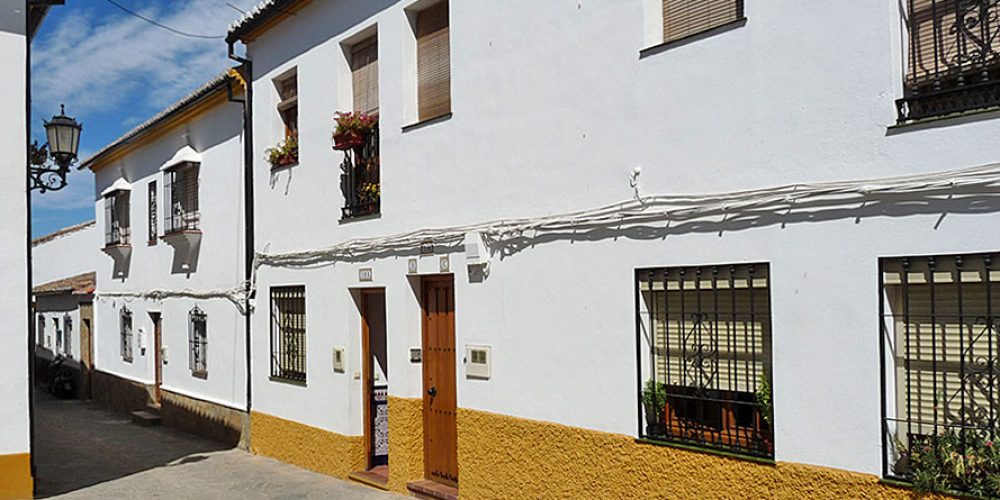 When I sold a property in 2019 for 85,000 euros, I made a capital gain of 25,000, so I was liable to pay tax on that. However, the afore-mentioned Daniel, was able to legitimately off-set so much, that my CGT bill was reduced to a mere 50 euros! And what did he charge me? 50 euros. What a bargain! When I sold a property in 2019 for 85,000 euros, I made a capital gain of 25,000, so I was liable to pay tax on that. However, the afore-mentioned Daniel, was able to legitimately off-set so much, that my CGT bill was reduced to a mere 50 euros! And what did he charge me? 50 euros. What a bargain!
I’m going to see him shortly to get him to help me claim a tax refund on some bonds I cashed in a few years ago and for which I was taxed, incorrectly, at the maximum rate. If I’m quick, that could be a nice little Christmas bonus!
Piso Blanco, Ronda, cost me 50€ in CGT [Photo PW]
Footnote
In my opinion people who try to do all this themselves are either crazy or foreigners. No Spaniard I know would dream of doing his own tax declaration or indeed anything official.
“Guiris” with little Spanish often try to do it themselves or use expensive lawyers.
As for me, also a "guiri", I love it that a gestor will do everything for me at a fair cost.
© The DIY Guy
Links:
Beating the Spanish tax man ... or not? - Olive Press News Spain
HOW TO ….. BUY A HOUSE in Spain?
HOW TO ….. do your Spanish INCOME TAX return?
SERRONSA - RONDA CENTRO COMERCIAL ABIERTO
Where there’s a WILL … the process in Spain - Secret Serrania de Ronda
Acknowledgements:
Gestoría Jimenez
Photos and Images:
Freepik
Gestoría Jimenez
Paul Whitelock
Wikipedia
Tags:
annual tax declaration, capital gain, CGT, cost of fuel and parking, DGT, Dirección General de Tráfico, driving licence, expensive lawyers, “fixer”, gestor, gestoria, guiri, Hacienda, Málaga, TIE, Tarjeta de Identidad de Extranjero, tax refund, toca madera, traffic fine
 0
Like
Published at 9:15 PM Comments (0)
0
Like
Published at 9:15 PM Comments (0)
HOW TO ….. keep your HOUSE IN SPAIN WARM in winter?
Tuesday, October 29, 2024
 With the cold and wet weather we have been experiencing in southern Spain since the clocks went back, people are turning their thoughts to heating their houses. With the cold and wet weather we have been experiencing in southern Spain since the clocks went back, people are turning their thoughts to heating their houses.
The DIY guy has spent the last quarter of a century living in the Serrania de Ronda, 16 of those as a resident. He reports that it can be extremely cold from November to February.
The DIY guy was a bit miffed when the Conservative government took away his winter heating allowance. He remained eligible to receive it when he moved to Spain, but the Tories withdrew it for anyone living south of a random horizontal line drawn across France.
Winter temperatures in the valley below Ronda where the DIY Guy now lives have been as low as MINUS 16 DEGREES CELSIUS and he reports that he has to scrape ice off his car windscreen every morning from November to February – every year.
Now the Labour Government is about to withdraw the winter heating allowance from most UK pensioners who receive it currently. Plus ça change, eh?
During the 25 years The DIY Guy has lived in Spain, he has occupied a number of properties in the Ronda area: a modern apartment; four old houses - two in Ronda and two in nearby Montejaque; and a modern chalet bungalow in the campo.
Here’s his report:
Preface
 The heating in each place I’ve lived in Spain was different, but I have to report that the easiest to heat and keep warm were the old houses, with their thick external walls and tiny windows. The heating in each place I’ve lived in Spain was different, but I have to report that the easiest to heat and keep warm were the old houses, with their thick external walls and tiny windows.
But, let’s start at the beginning:
Photo courtesy of iStock
Piso Blanco, Ronda
 This was the first property we bought in Spain, back in 2001. Located in the sought-after Barrio San Francisco, it was a modern apartment in a comunidad of 10 dwellings with gardens and a pool. This was the first property we bought in Spain, back in 2001. Located in the sought-after Barrio San Francisco, it was a modern apartment in a comunidad of 10 dwellings with gardens and a pool.
Great in the summer, but bloody cold in winter. We came for Christmas a couple of times, and, after my redundancy and divorce, I spent increasing amounts of time living in Piso Blanco, which I retained after our divorce in 2005.
Piso Blanco, Ronda [Photo: Paul Whitelock]
The apartment had gas central heating, but it was single-glazed with ill-fitting pine windows and, madre mía, it was bitter cold. Piso Blanco also benefited from a traditional brasero beneath a round wooden table, over which you placed a thick tablecloth/blanket which reached to the floor. Great for warm legs, but cold backs!
  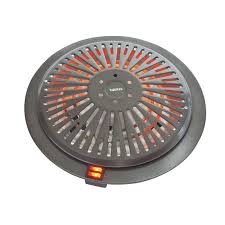
Traditional tables with space for a brasero [Photos: The Vintage Rooms] An electric brasero [Photo: Amazon]
Casa Blanca, Ronda
This house was an end-terrace bungalow, not 50 metres from Piso Blanco. It had a SE VENDE sign on it, but it looked pretty dilapidated. My mum, Vera, who was staying with us in Piso Blanco at the time, pushed at the front door and it swung wide open!
A quick look around to see if anyone was watching – no, all clear – so we slipped inside.
Part of the lounge floor had collapsed, and the bathroom and kitchen were a mess. Outside, what had probably been a large terrace, had become a dumping ground for the locals’ rubbish over many years.
Mum did one of her little smiles and winked at me. She liked it. She and my late dad had done up a few houses in their time.
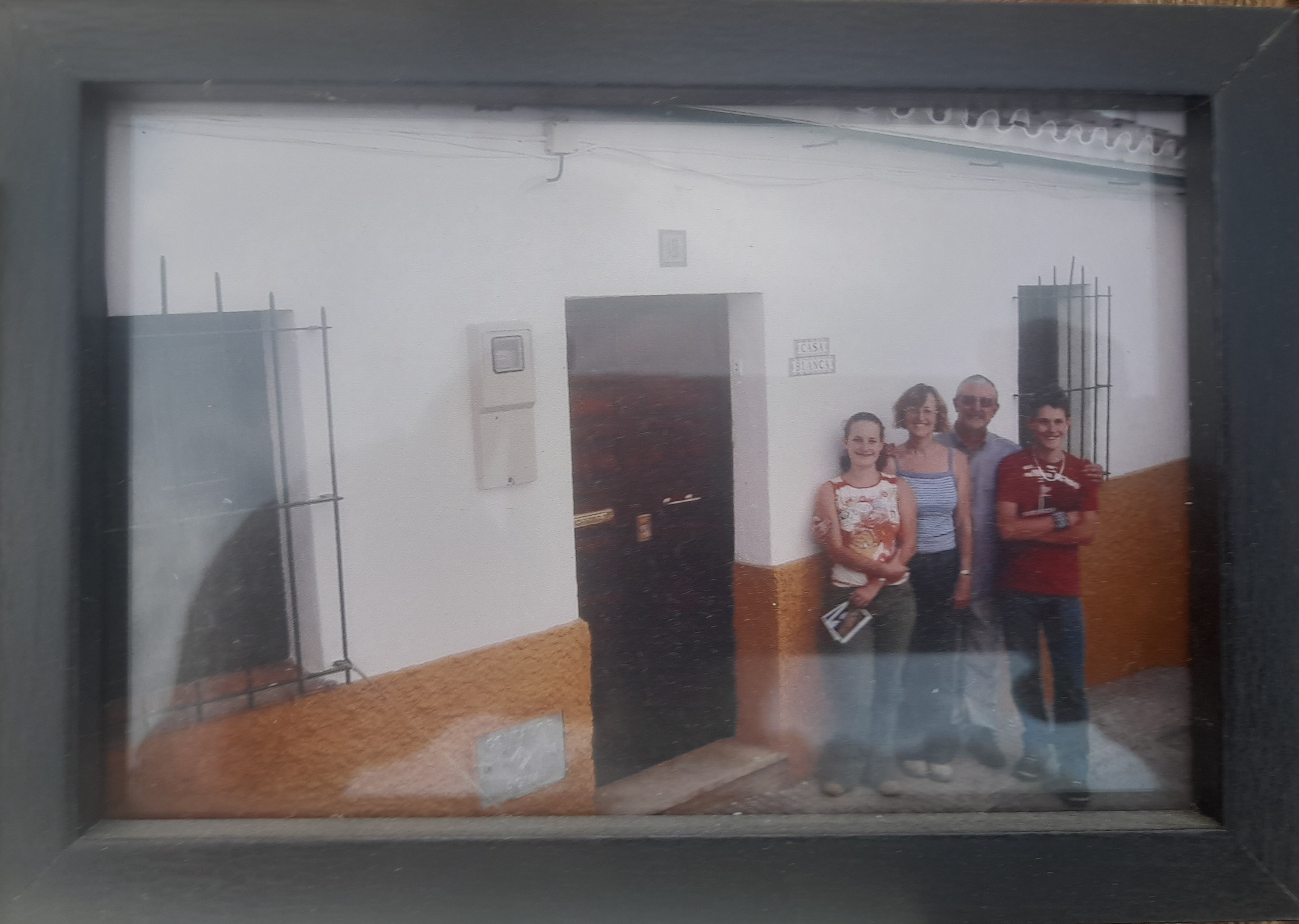 So, with mum’s approval and less enthusiastic support from my wife, Jeryl, we set about investigating further. So, with mum’s approval and less enthusiastic support from my wife, Jeryl, we set about investigating further.
The house belonged to Paco and Paqui who owned and ran Bodega San Francisco in the Barrio, one of our regular haunts.
Long story short, we bought the house, for not much money really, and over the next couple of years, with the help of family and friends, we gutted it and did it up.
Amy, Jeryl, The DIY Guy and Tom outside Casa Blanca
[Photo: Johnny White]
As for heating, there was no fireplace, so we relied on a mixture of oil-filled electric radiators and electric fires. It was freezing in the winter months.
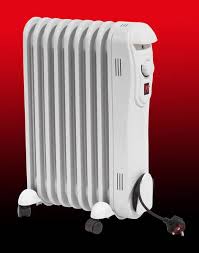 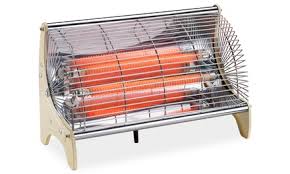
Photo: TLC Heating Supplies Photo: Groupon
El Rincón, Ronda
By 2005 I was divorced and early-retired (55) and with a new lady, Maude. to "step out with". On a long weekend in Ronda – Maude's first-ever visit to the City of Dreams – she bought a little old house, which was charming but rather down-on-its-luck!
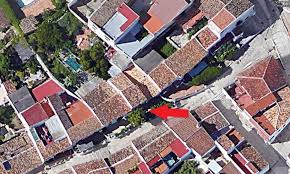 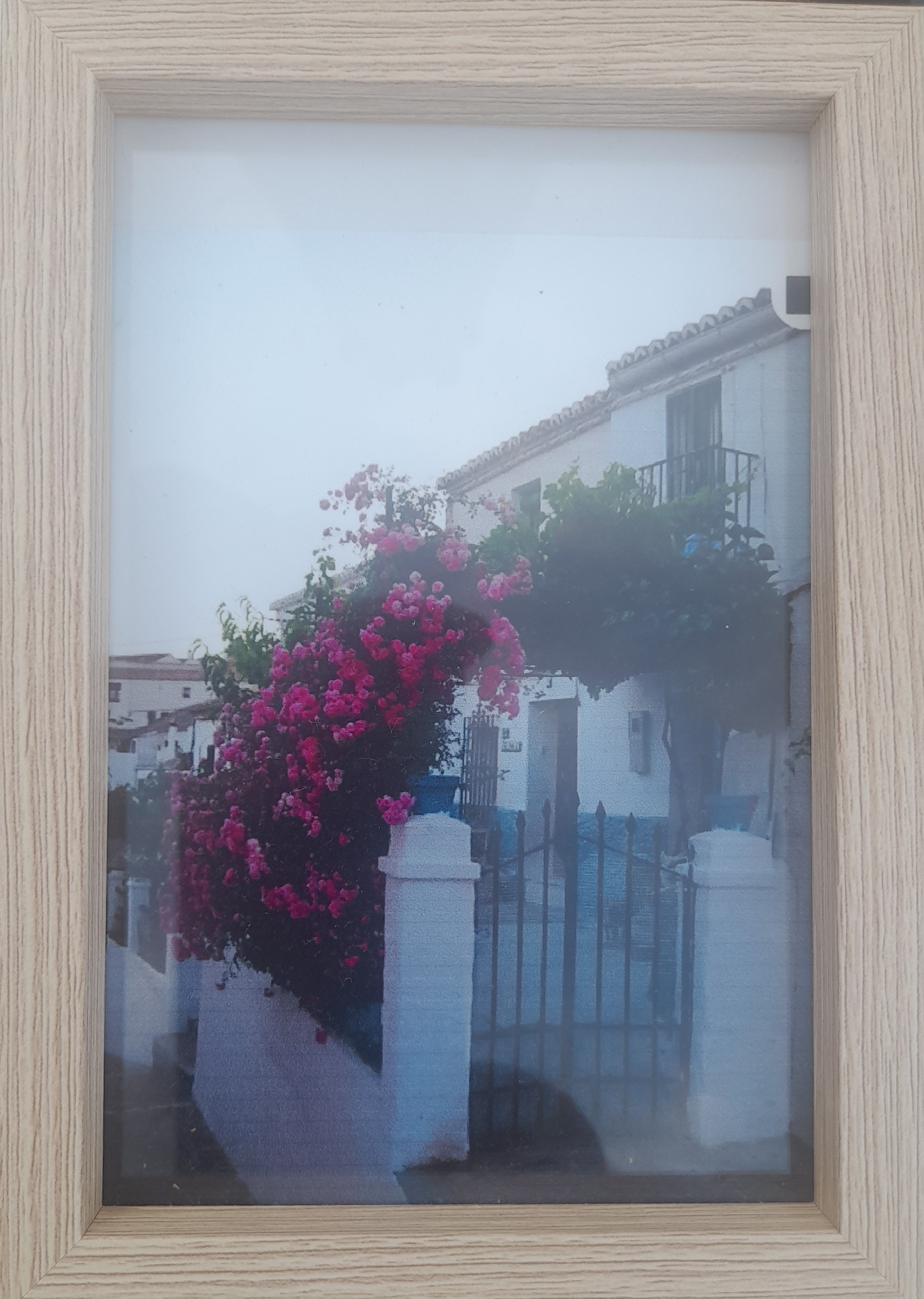
Aerial view of El Rincon, Ronda [Photo: Google Earth] Entrance to El Rincon [Photo: PW]
Guess what? I was retired and she was still working, so I ended up spending months at a time in Ronda, doing up her house and garden. I didn’t mind, however. I’d fallen in love with Spain when I was 20. I was now 55, and that love had not diminished one bit.
(awaiting photo)
The DIY Guy laying a garden terrace [Photo: Mary Jackson]
During these periods I built myself a decent social life in Ronda, so had no complaints at all.
Heating in El Rincón was non-existent. We had to manage with electric radiators and fires, but because it was a terraced-house and the front and rear walls were half-a-metre thick, it was tolerable.
Casa Rita, Montejaque
This was the house of the German lady I met in Ronda in September 2008. Rita and I soon fell in love. She visited me in England a few times that autumn and I went to Germany for her grandson’s christening. By Christmas I had emigrated to Spain.
 Casa Rita was Rita’s home having left Germany a few years before. It was well appointed, had a great chimenea and gas stoves. The house was old and had thick external walls. It was cosy in the winter and cool in the summer. Casa Rita was Rita’s home having left Germany a few years before. It was well appointed, had a great chimenea and gas stoves. The house was old and had thick external walls. It was cosy in the winter and cool in the summer.
Rita and I have now been married for 14 years and no longer live there, although we go and stay from time to time.
During the Covid lockdowns we took the time to upgrade the house. New double-glazed windows throughout, wall heaters in the two bathrooms and a pellet stove in the open-plan lounge we had created downstairs. There are still a couple of gas stoves as back-up. Casa Rita is now “as warm as toast”.
Rita posing on the roof terrace of Casa Rita [Photo: Karl Smallman]
***
After we got married in 2010 we started looking round for a house with better access, a pool and a garden. We found “just the job” in Fuente de la Higuera, in the campo just outside Ronda. We moved in on 3 February 2011 on a bright sunny Saturday.
Villa Indiana, Fuente de la Higuera
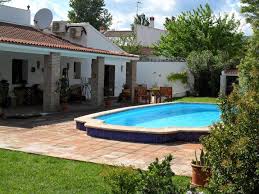
Villa Indiana view from rear [Photo: Karl Smallman]
Within a couple of weeks of moving in it was pouring down and freezing cold. Our garden and lawns were flooded. Aargh!
 The heating seemed quite sophisticated. There was oil-fired central heating throughout and a chimenea in the lounge. The windows and doors were high-quality double-glazed units The heating seemed quite sophisticated. There was oil-fired central heating throughout and a chimenea in the lounge. The windows and doors were high-quality double-glazed units
BUT, BUT, BUT …..
Villa Indiana is a modern house with only 9-inch solid external walls, no insulation in the roof, no damp-proof course and larger-than-normal windows, so, warm and cosy it ain’t!
But we manage when it’s very cold. A thick jumper usually does the trick.
Photo courtesy of Roferi and Rodi
***
I had sold Casa Blanca in Ronda in 2008 to help finance the purchase of a house for me to live in in England. My relationship with Maude had ended, so I had left North Wales and had moved in with my mum in Warrington.
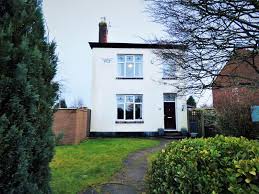 I decided I needed a place of my own, so bought a detached Victorian villa in Latchford, a suburb of Warrington, as a do-er up-per. I decided I needed a place of my own, so bought a detached Victorian villa in Latchford, a suburb of Warrington, as a do-er up-per.
I completed the purchase of Tunstall Villa around the time I met the “Lovely Rita”.
Despite emigrating to Spain in December 2008 to be with Rita, I went back to Warrington to work on my house for several lengthy periods over the next three years.
Tunstall Villa, Latchford [Photo: On The Market]
When Tunstall Villa was finished, I sold it to pay for Villa Indiana, the house we had found just outside Ronda, as outlined above.
***
In 2019 I decided to sell Piso Blanco, which I had owned for some 18 years by that 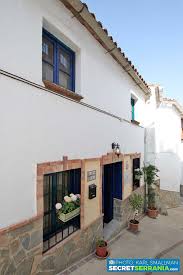 time. It needed some urgent work, and I had neither the money nor the inclination to do it. time. It needed some urgent work, and I had neither the money nor the inclination to do it.
I banked the money from the sale of Piso Blanco and watched as it earned virtually zero interest for two years.
Then, one Sunday I was in Montejaque and I stumbled across a house with a SE VENDE sign. It turned out that it was owned by my favourite bar owner in the village, Armando, and his three siblings.
I viewed the house, liked it and bought it for a good price.
The heating consists of a pellet stove in the open-plan lounge, dining room and kitchen, plus portable gas heaters. I ran the flue of the pellet stove through one of the bedrooms upstairs, which takes the chill off that room.
Casa Real, Montejaque [Photo: Karl Smallman]
 
A pellet stove [Photo: Climmatic] A gas stove [Leroy Merlin]
Casa Real is not cold in the winter. With the pellet stove, double-glazed windows and back-up gas stoves, added to the half-metre thick external walls, it is not a cold house, despite being some 800 metres above sea level.
Last word
Although I am now well into my 70s, I hanker after another building project. To have the funds to do that, however, I would have to sell Casa Real and run the risk of Rita divorcing me!
So, it looks like it’s time to hang up my trowel, my hammer and my drill, don my slippers and sit by the fire, watching TV and stroking the pussy.
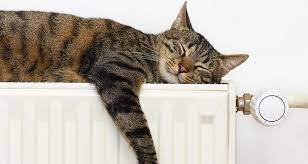
Photo courtesy of Halifax BS
© The DIY Guy

Related Links:
CASA REAL, Montejaque (Malaga) - Help me, Ronda
CASA RITA, MONTEJAQUE - An immaculate fully renovated 3-bed, 3-bath property - 200,000€. - Help me, Ronda
HOW TO ….. get your HOUSE WARM?
How to keep a Spanish house warm in Winter « Euro Weekly News
Acknowledgements:
EuroWeekly News
Johanna Gardener
Paul Whitelock
www.help-me-ronda.com
www.secretserrania.com
Photos:
Amazon
Climmatic
Facebook
Google Earth
Groupon
Halifax Building Society
iStock
Johnny White
Karl Smallman
Leroy Merlin
Mary Jackson
On The Market
Paul Whitelock
Roferi and Rodi
TLC Heating Supplies
The Vintage Rooms
Tags:
9-inch solid external walls, Amazon, “as warm as toast”, Barrio San Francisco, Bodega San Francisco, Casa Blanca, Casa Real, Casa Rita, chimenea, Climmatic, Covid, damp-proof course, double-glazed units, double-glazed windows, Durazno, electric fire, El Rincon, Facebook, fireplace, Fuente de la Higuera, gas stove, Google Earth, Groupon, half-metre thick external walls, Halifax Building Society, Help Me Ronda, insulation in the roof, iStock, Jeryl, Johnny White, Karl Smallman, larger-than-normal windows, Latchford, Leroy Merlin, lockdown, “Lovely Rita”, Lucero, Mary Jackson, Maude, Montejaque, oil-filled electric radiator, oil-fired central heating, On The Market, Paul Whitelock, pellet stove, Piso Blanco, pussy, Roferi and Rodi, Ronda, Serrania de Ronda, SE VENDE, TLC Heating Supplies, The DIY Guy, The Vintage Rooms, thick external walls, Tunstall Villa, Victorian villa, Villa Indiana, wall heater, Warrington, winter heating allowance
 5
Like
Published at 12:50 PM Comments (2)
5
Like
Published at 12:50 PM Comments (2)
HOW TO ..... renovate a COFFEE TABLE?
Wednesday, October 16, 2024
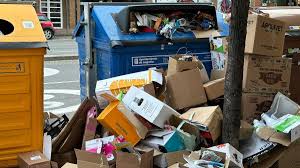
Everytime I go to Ronda I have to pass the local rubbish depository. There is often something discarded there that is crying out to be recycled.
The Spanish don't really go in for selling things de segunda mano (second-hand), so they just chuck it away.
I don't mind. Over the years I have acquired a number of items, usually furniture, that are in perfectly good condition. These items include dining chairs, tables, garden items, children's toys, even original paintings!
I renovate and clean these things up and either put them to good use or sell them on.
Coffee table - October 2024
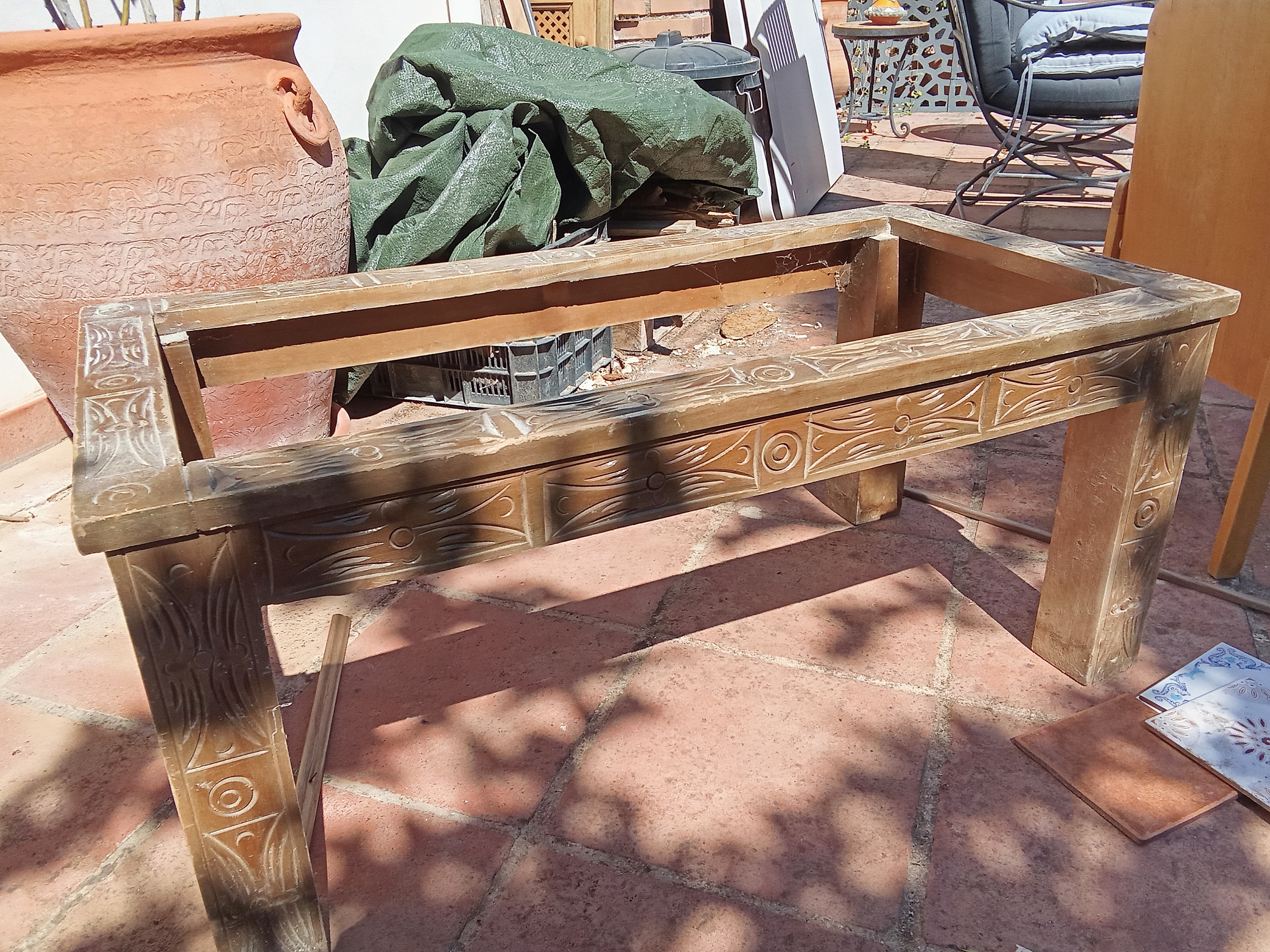 What do Spaniards have against wood? They throw away perfectly good solid wood furniture and buy modern c**p made of laminates, formica, metal and plastic! What do Spaniards have against wood? They throw away perfectly good solid wood furniture and buy modern c**p made of laminates, formica, metal and plastic!
The other day I spotted what looked like a coffee table. It was rather splendid. Solid wood with a carved pattern. The table top was missing, probably it had been a glass insert.
I checked for woodworm, rot and other infestations - no sign of anything bad, so I opened the car boot and popped it in.
The renovation
After a ponder I decided to replace the missing glass with a ceramic top, made from tiles I had left over from other jobs. As a base I used a piece of thick plywood, also picked up at the dump.
So, I gave the table a light rub-down with sandpaper, cut the plywood to size and fixed it in place using screws and decided on the tiles I would use.
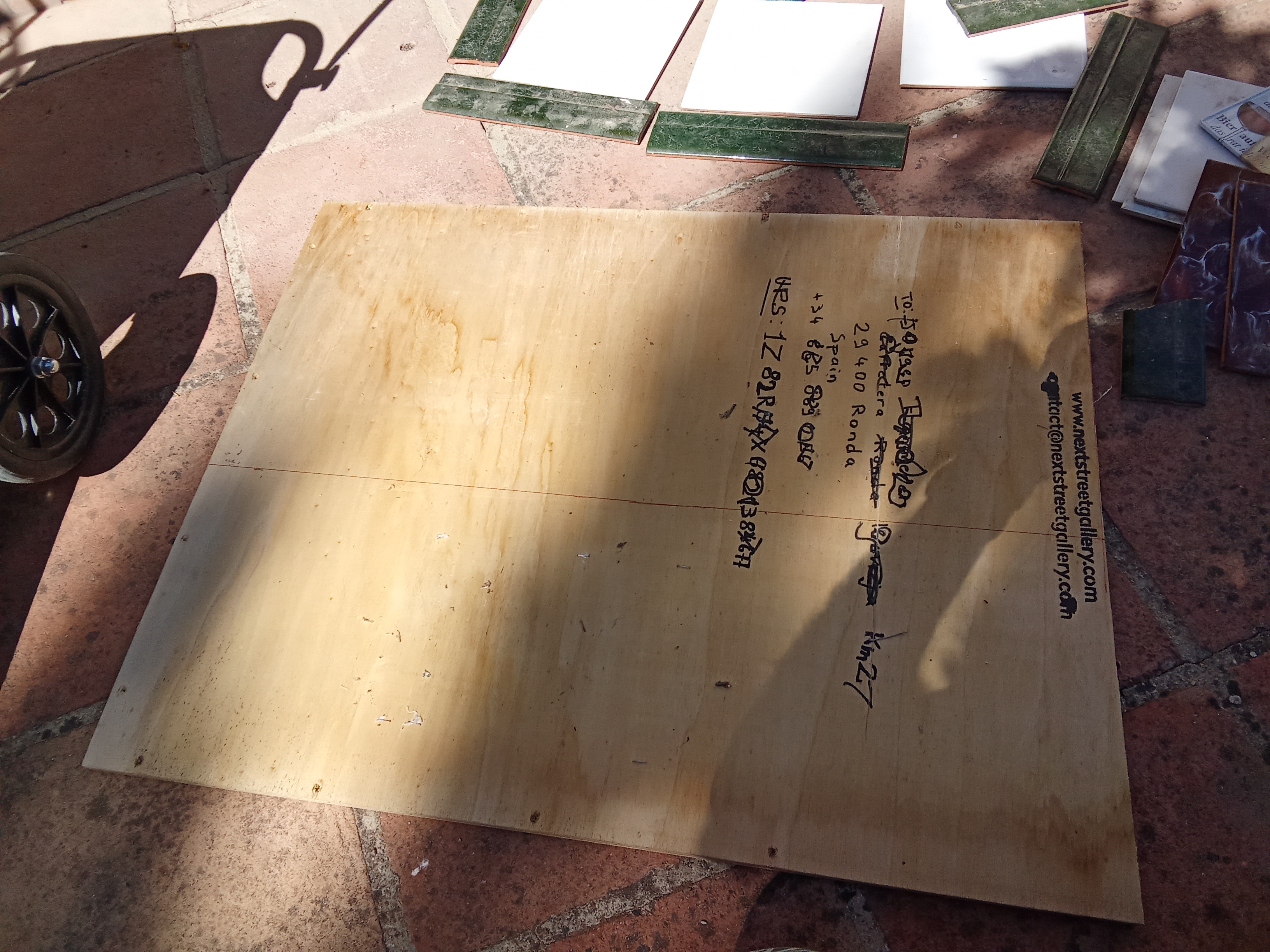 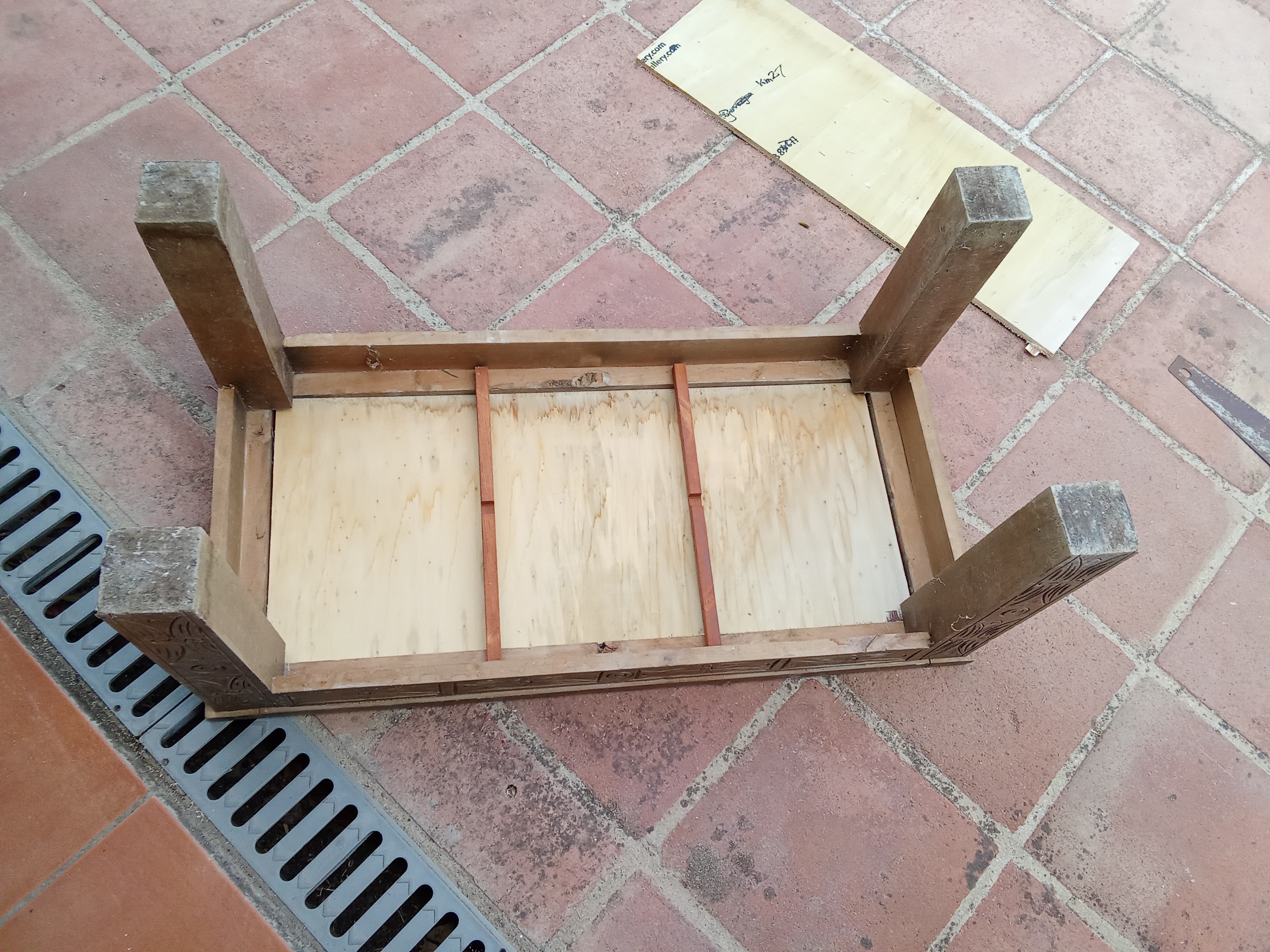
Next, I removed the dust and painted the table to seal it and give it a distressed look. I chose the colour nogal (walnut).
The following day I fixed the tiles which I had previously cut to size.
The day after that I grouted the gaps and cleaned the table up.
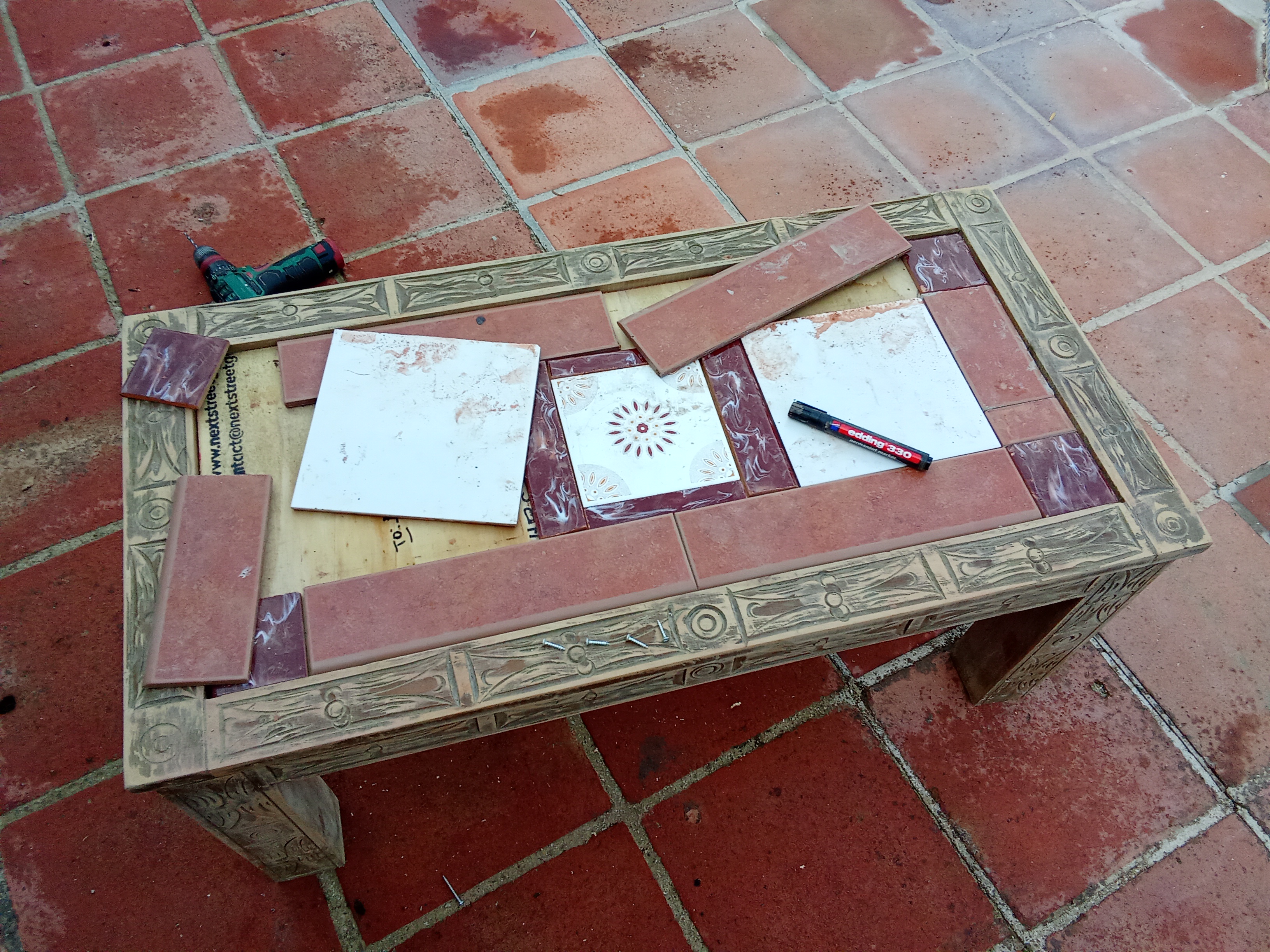 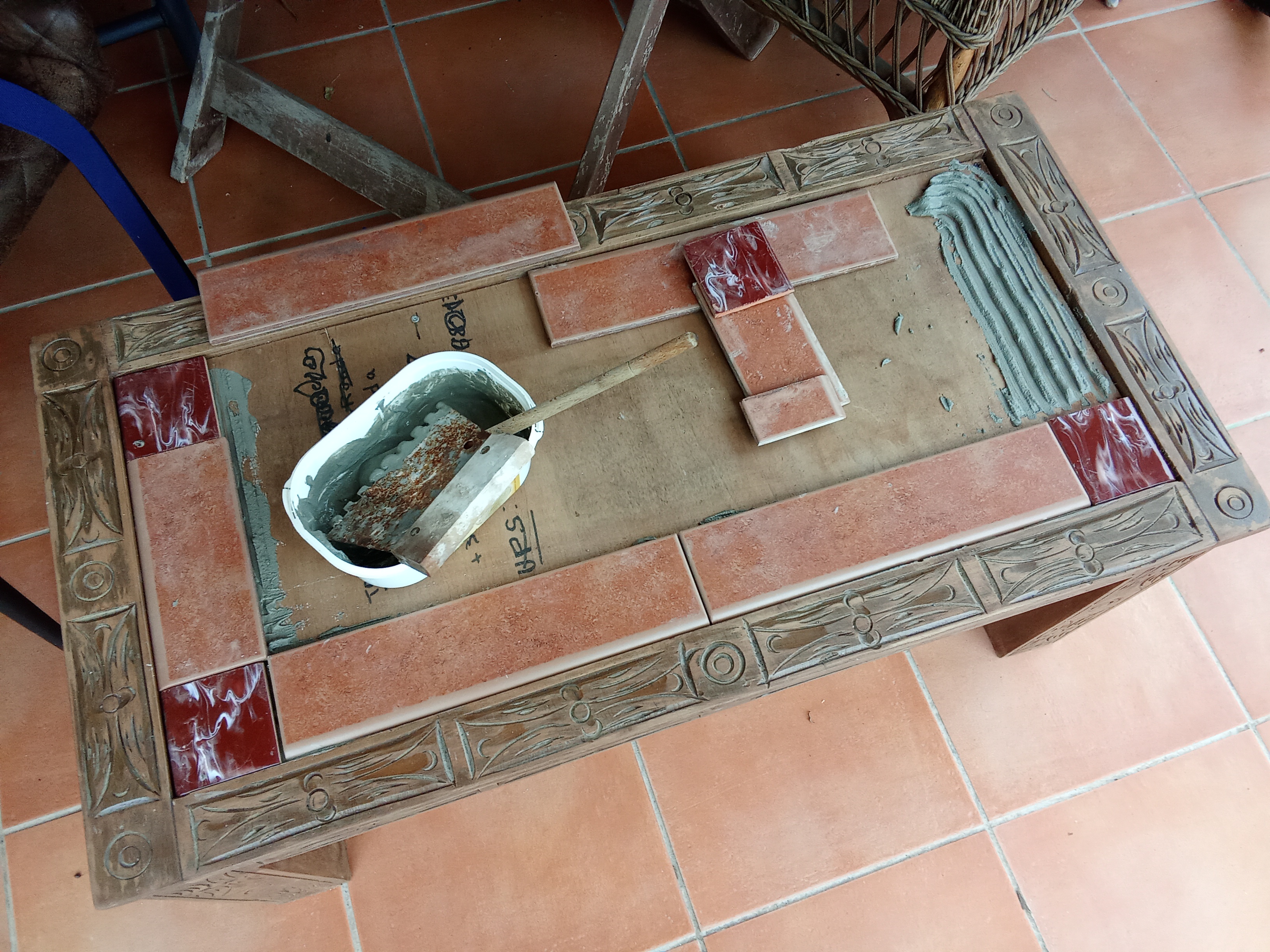 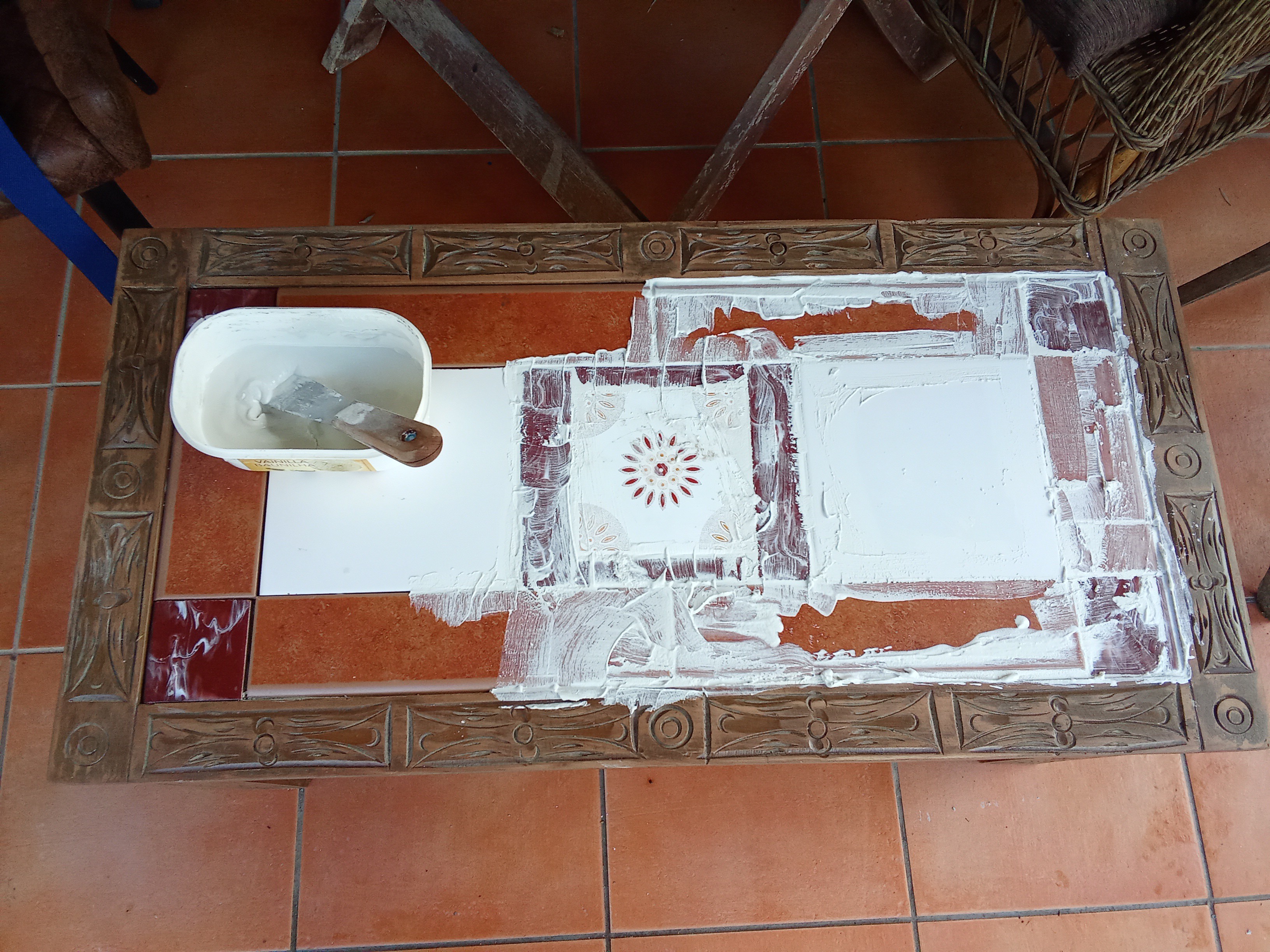
My "good-as-new" coffee table
The recovered and renovated coffee table is now usable. Ideal for a glass of cava before dinner.
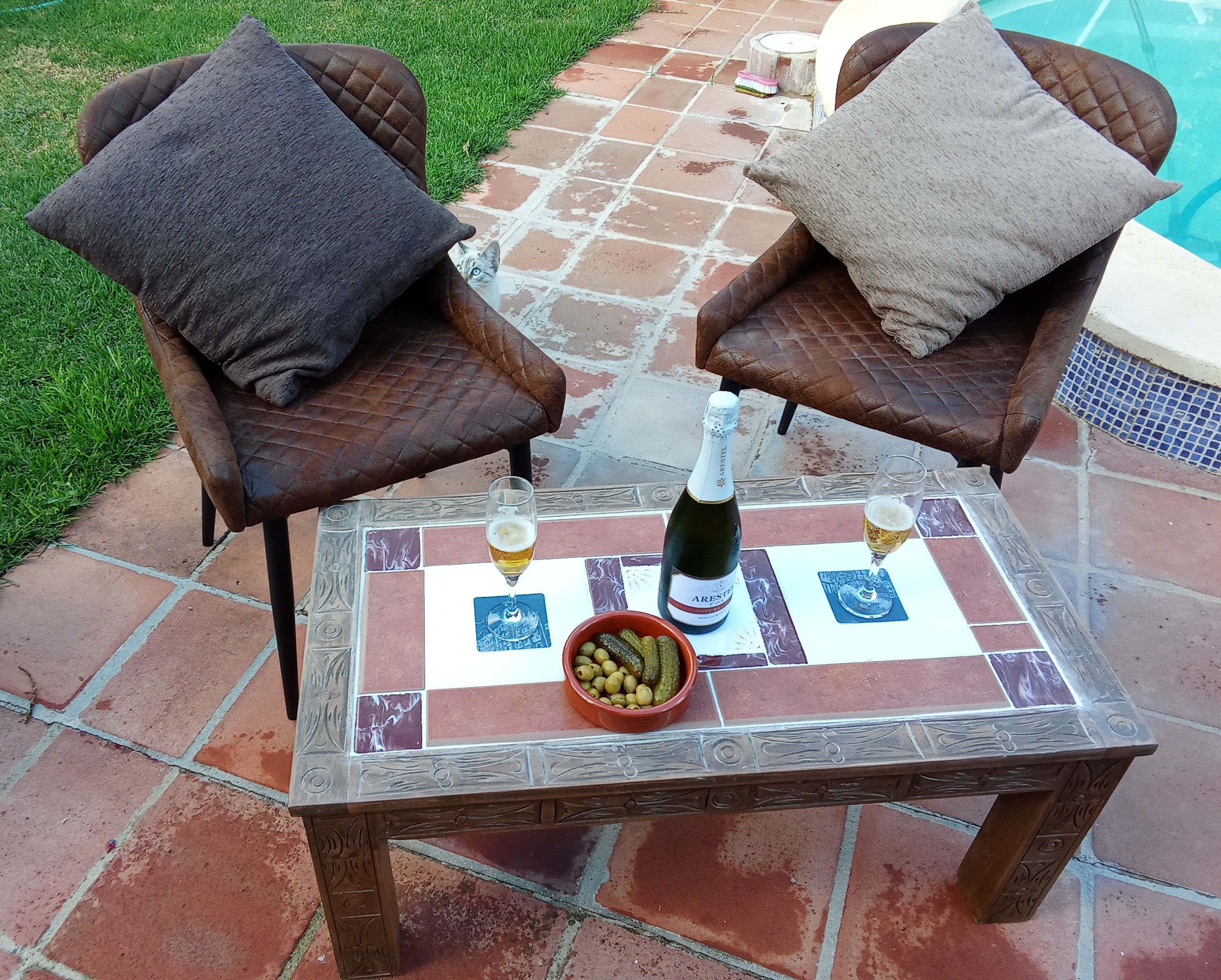 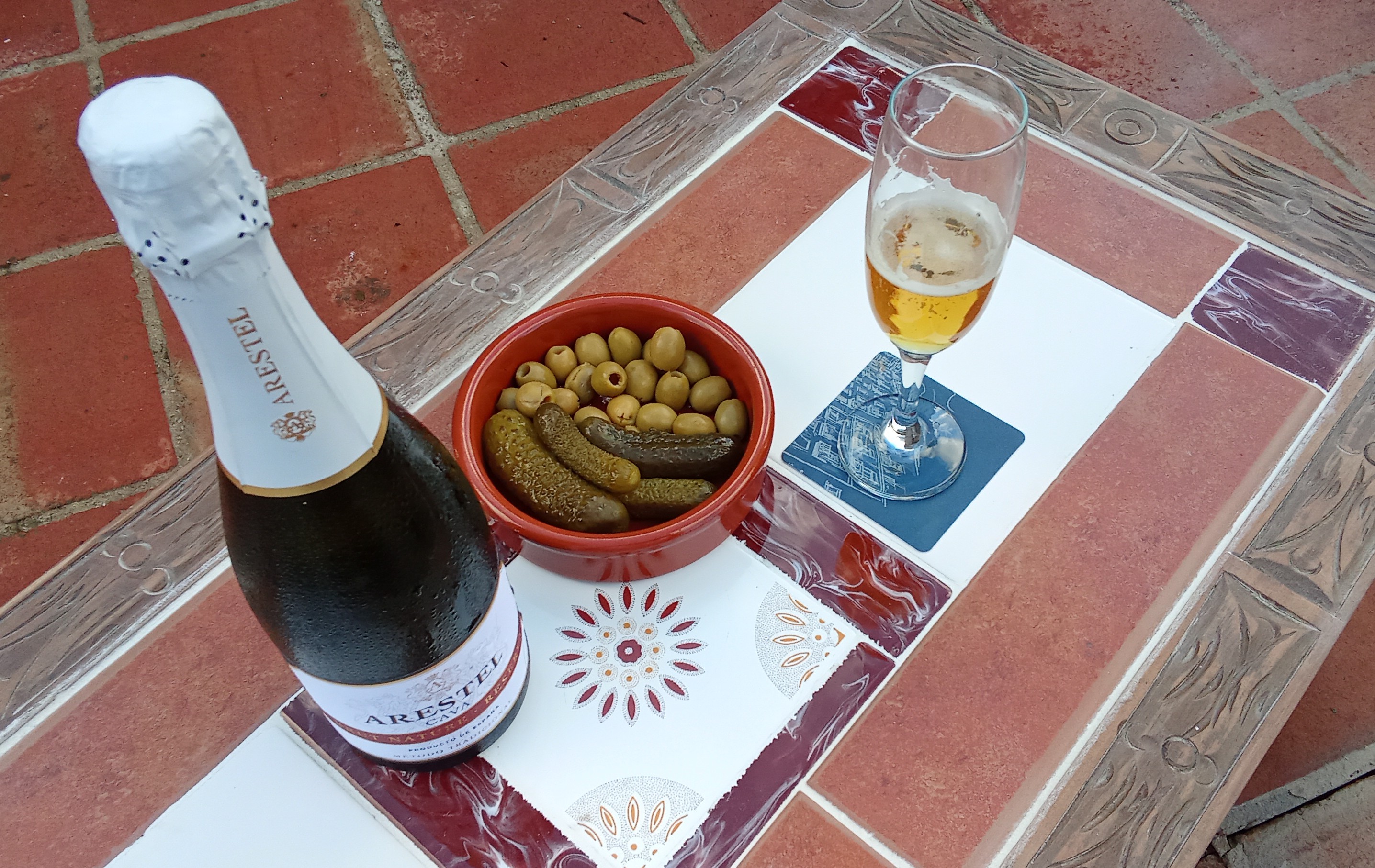 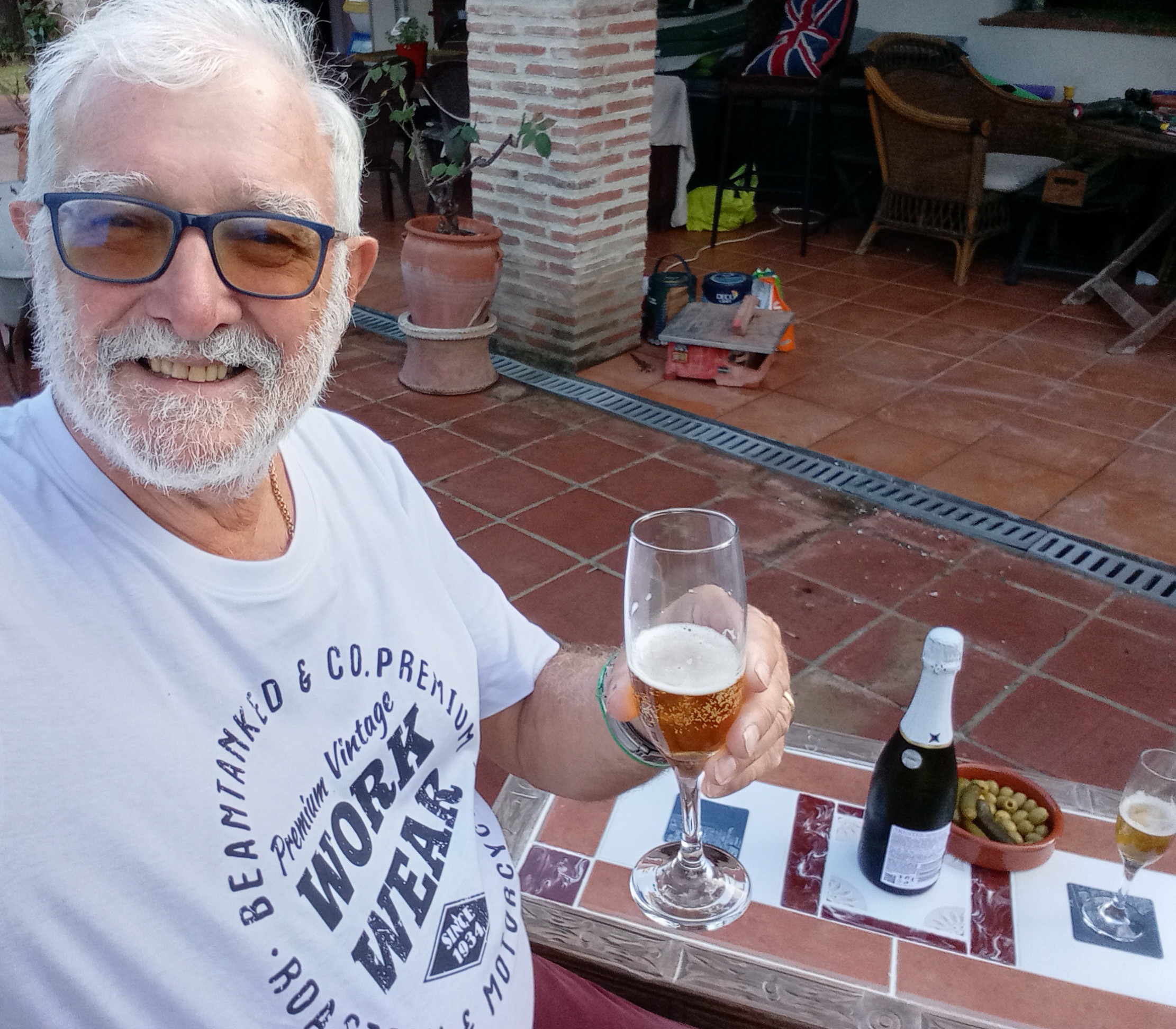
The only cost was a bag of tile adhesive. I found some left-over grout in my almacén.
I'm very pleased with the result. What do YOU think?
***
All photos by "The DIY Guy" except cover photo by Diario.es
© The DIY Guy
Tags:
coffee table, Diario.es, dump, formica, good-as-new, infestation, laminates, metal, plastic, recycling, renovation, Ronda, second-hand, The DIY Guy, tile adhesive, white grout, wood, woodworm
 3
Like
Published at 7:05 PM Comments (1)
3
Like
Published at 7:05 PM Comments (1)
WD-40 – Another Wonder Product?
Thursday, September 26, 2024
by The Crazy Guy
WD-40 is an iconic brand in the US and in the UK.  Doesn’t everybody have a can in the garage? For the car or the push bike? Doesn’t everybody have a can in the garage? For the car or the push bike?
But this clever lubricant can do so much more than dry out damp battery terminals or lubricate bicycle chains.
The blue and yellow aerosol can is, in fact, more than just a lubricant.
Here are six-of-the-best other uses for WD-40
Image courtesy of WD-40
1. Toilet Bowl Ring Remover
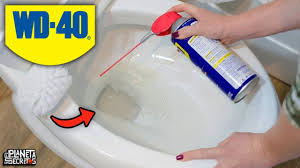 Spray WD-40 directly onto the toilet bowl ring and let it sit for a few minutes to break down the mineral deposits and grime. Then, scrub the area with a toilet brush as usual. Spray WD-40 directly onto the toilet bowl ring and let it sit for a few minutes to break down the mineral deposits and grime. Then, scrub the area with a toilet brush as usual.
The WD-40 helps to lift and dissolve the buildup, leaving your toilet bowl clean and shiny.
Rinse thoroughly with water, and enjoy a fresh, stain-free toilet bowl with minimal effort!
Image courtesy of YouTube
2. Clean and Protect Garden Tools
Spray WD-40 on your garden tools to prevent rust and keep them in top condition. It also makes cleaning off dirt and sap much easier.

Image courtesy of WD-40 Australia
3. Loosen Stuck Zips
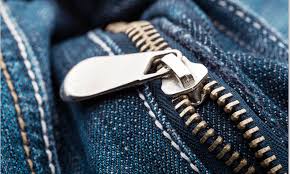 Got a zip that is jammed? A short blast of WD-40 on the zip teeth can help it glide smoothly again. Got a zip that is jammed? A short blast of WD-40 on the zip teeth can help it glide smoothly again.
Image courtesy of WD-40
4. Keep Locks from Freezing
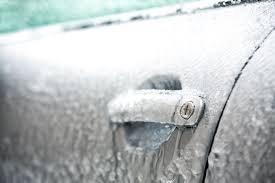 In cold weather, spray WD-40 into your car locks to prevent them from freezing. It’s a lifesaver during those icy winter months. In cold weather, spray WD-40 into your car locks to prevent them from freezing. It’s a lifesaver during those icy winter months.
Photo courtesy of Uniroyal
5. Remove Stickers and Labels
Struggling to peel off 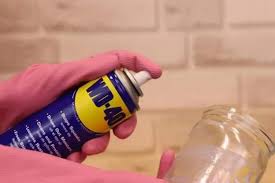 stubborn stickers and labels? Spray WD-40 on the sticker, wait a few minutes, and then easily scrape it off. This works wonders on jars, mirrors, and even furniture. stubborn stickers and labels? Spray WD-40 on the sticker, wait a few minutes, and then easily scrape it off. This works wonders on jars, mirrors, and even furniture.
Image courtesy of WD-40
6. Remove Scuffs and Stains from Floors
S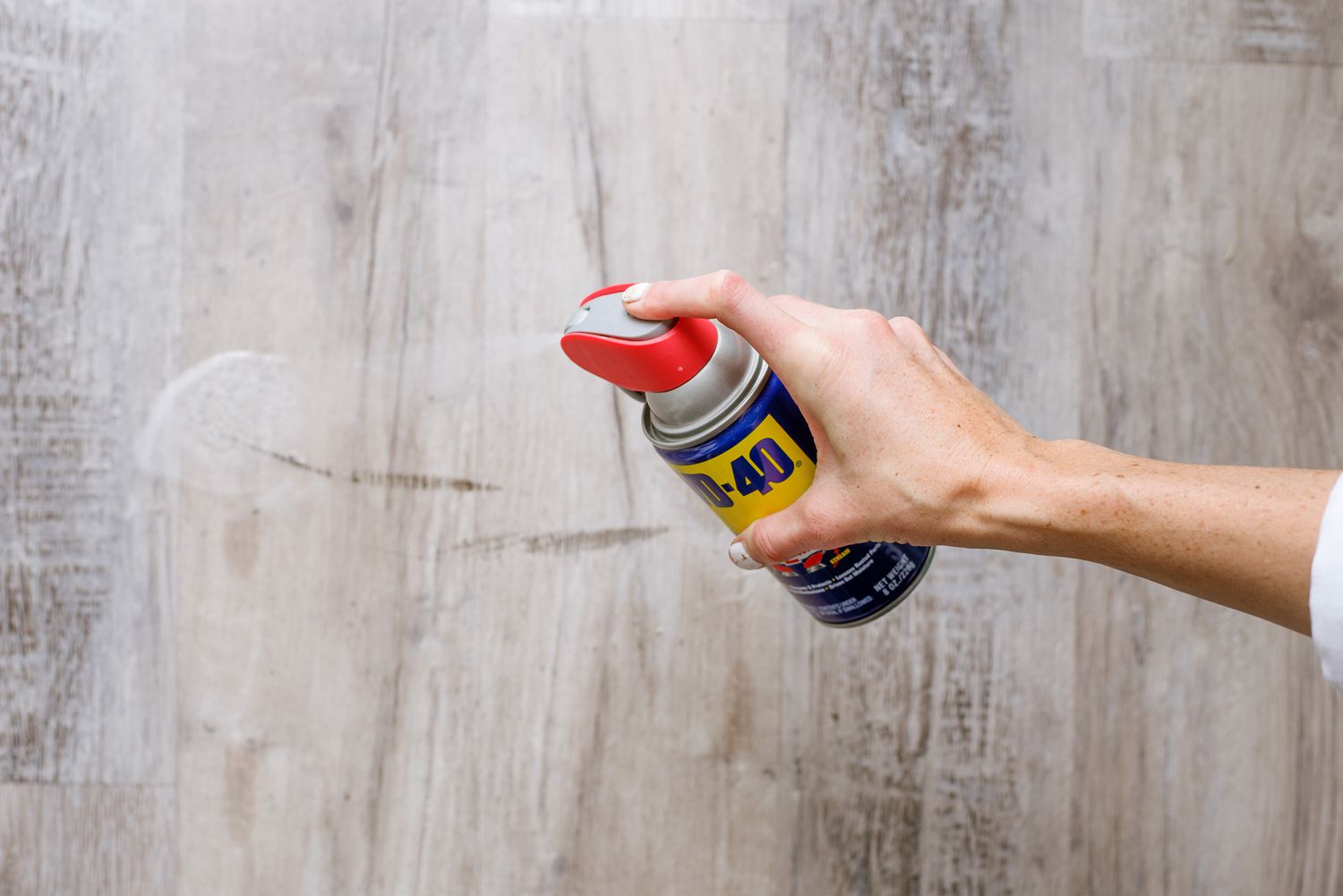 pray a bit of WD-40 on a cloth and gently rub scuff marks off your floors. This works on tile, wood, and laminate surfaces. pray a bit of WD-40 on a cloth and gently rub scuff marks off your floors. This works on tile, wood, and laminate surfaces.
Image courtesy of The Spruce
***
Six-of-the-best
By incorporating these six clever WD-40 ideas into your home maintenance routine, you can save time, effort, and money. Give them a try and see how this versatile product can make your life a bit easier!
© The Crazy Guy
Acknowledgements:
Paul Whitelock, Simplify, The Spruce, Uniroyal, WD-40
Tags:
Clean and Protect Garden Tools, Keep Locks from Freezing, Loosen Stuck Zips, Remove Scuffs and Stains from Floors, Remove Stickers and Labels, Simplify, Six-of-the-best, The Crazy Guy, The Spruce, toilet bowl, Uniroyal, WC, WD-40
 4
Like
Published at 6:00 AM Comments (1)
4
Like
Published at 6:00 AM Comments (1)
Spam post or Abuse? Please let us know
|
|